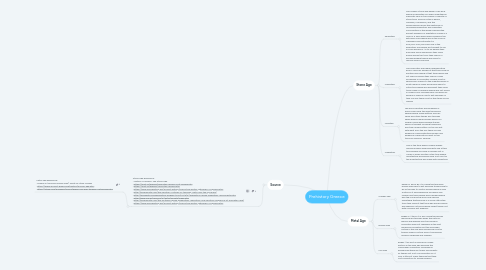
1. Source
1.1. Stone Age Reference: -History of Greece: The Stone Age -https://quatr.us/greeks/paleolithic-greece-first-people.htm -https://quatr.us/greeks/mesolithic-greece.htm -https://www.worldhistory.biz/ancient-history/50533-the-hunter-gatherers-of-greece.html -http://brewminate.com/the-neolithic-cultures-of-thessaly-crete-and-the-cyclades/ -http://greekhistoryandprehistory.blogspot.com/2016/01/prehistoric-greek-megalithic-monuments.html -http://www.ime.gr/chronos/01/en/pl/society/index.html -http://brewminate.com/the-southern-greek-palaeolithic-mesolithic-and-neolithic-sequence-at-franchthi-cave/ -https://www.worldhistory.biz/ancient-history/50533-the-hunter-gatherers-of-greece.html
1.1.1. Metal Age Reference: -Greece in the Early Bronze Age | Quatr.us Study Guides -https://www.ancient-greece.org/history/bronze-age.html -https://study.com/academy/lesson/greek-iron-age-timeline-mythology.html
2. Stone Age
2.1. Paleolithic
2.1.1. The Greece Stone age began 7250 BCE which is paleolithic era were unearthed in Franchthi cave in the Argolid. A wealth of stone tools found in sites in Epirus, Thessaly, Macedonia, and the Peloponnesse reveal the existence of flourishing Paleolithic and Mesolithic communities in the greek mainland the earliest evidence of habitation comes in a form of a skull which was founded in the petralona cave which was in the cave of Halikidiki some estimate it is 300,000-400,000 years old in the paleolithic era people are thought to live in small groups of 10 to 30 people they also have social symbolism they used animal bones the tools they used is a backed bladelet which was used to remove flesh from hide
2.2. Mesolithic
2.2.1. The Mesolithic era began approximately 9000-7000 BC people at that time lived on hunting and fishing at that time people did not lived in houses they lived in caves somebody in Mesolithic Greece must of sailed from Greece to the mediterranean in boats made of reeds and animal skins to catch tuna which was abundant they used tools made of obsidian which was not found in Greece only founded near volcanoes so people in Greece rush to get obsidian so they can sell them most of the items are for fishing
2.3. Neolithic
2.3.1. The early Neolithic period began in 6000-5300 BCE this was the period where people made pottery such as vases and other things also this was when people made houses which is a sunken floors where people stayed which is thought of being temporary also they made pottery not by fire but with heat from the sun there are also evidence of domesticated animals and evidence of agriculture most of the tools are used for farming
2.4. Megalithic
2.4.1. This is the time where Greece began having modern advancements and at this time people are living in houses not in caves or holes and this is the time where architecture was being used a lot most of the architecture was made with limestone
3. Metal Age
3.1. Copper Age
3.1.1. began in 3000 BC It is called that because bronze was hard to get because traders had to go all the way to central europe which is now Austria so it was expensive so people use copper and then people were divided which was the rich and the poor and owning something thats bronze is a social status the tools they used at that time was bronze sword and jewellery actually people inherit things not with currency but jewellery
3.2. Bronze Age
3.2.1. began in 11th bc It is also called the heroes age because this was when the myth of heroes and legends also the Minoans civilisation was first regarded as the first advanced civilization but the mycinean culture is the one who influenced most of todays Greece culture since it influenced Greeces language and legends
3.3. Iron Age
3.3.1. Began 1100 bcit is referred in Greek history as the dark age because the Mycenaean civilisation collapsed or abandoned there isn't many documents so theres not a lot of information on it only a little bit. many theorise that they lost connection to foreign powers

